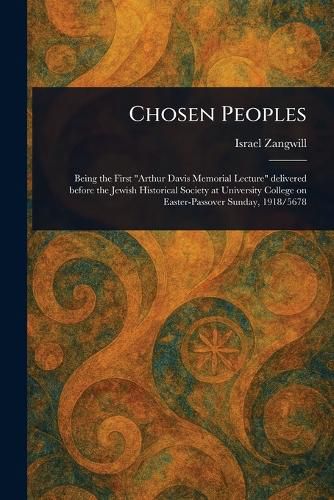Readings Newsletter
Become a Readings Member to make your shopping experience even easier.
Sign in or sign up for free!
You’re not far away from qualifying for FREE standard shipping within Australia
You’ve qualified for FREE standard shipping within Australia
The cart is loading…






This title is printed to order. This book may have been self-published. If so, we cannot guarantee the quality of the content. In the main most books will have gone through the editing process however some may not. We therefore suggest that you be aware of this before ordering this book. If in doubt check either the author or publisher’s details as we are unable to accept any returns unless they are faulty. Please contact us if you have any questions.
Explore the historical concept of a "Chosen People" in Israel Zangwill's "Chosen Peoples." This compelling work, originally delivered as the inaugural Arthur Davis Memorial Lecture before the Jewish Historical Society in 1918, delves into the doctrine of election and its significance within Jewish history and thought.
Zangwill examines the multifaceted implications of this concept, providing historical context and exploring its enduring relevance. This meticulously prepared print edition offers readers a unique opportunity to engage with a foundational idea in Judaism.
A vital resource for those interested in Jewish history, religious thought, and the intersection of religion and science, "Chosen Peoples" provides valuable insights into a complex and enduring theme. Its exploration of Jewish identity and the notion of a chosen people makes it a timeless contribution to the understanding of Jewish history and religious doctrine.
This work has been selected by scholars as being culturally important, and is part of the knowledge base of civilization as we know it.
This work is in the public domain in the United States of America, and possibly other nations. Within the United States, you may freely copy and distribute this work, as no entity (individual or corporate) has a copyright on the body of the work.
Scholars believe, and we concur, that this work is important enough to be preserved, reproduced, and made generally available to the public. We appreciate your support of the preservation process, and thank you for being an important part of keeping this knowledge alive and relevant.
$9.00 standard shipping within Australia
FREE standard shipping within Australia for orders over $100.00
Express & International shipping calculated at checkout
This title is printed to order. This book may have been self-published. If so, we cannot guarantee the quality of the content. In the main most books will have gone through the editing process however some may not. We therefore suggest that you be aware of this before ordering this book. If in doubt check either the author or publisher’s details as we are unable to accept any returns unless they are faulty. Please contact us if you have any questions.
Explore the historical concept of a "Chosen People" in Israel Zangwill's "Chosen Peoples." This compelling work, originally delivered as the inaugural Arthur Davis Memorial Lecture before the Jewish Historical Society in 1918, delves into the doctrine of election and its significance within Jewish history and thought.
Zangwill examines the multifaceted implications of this concept, providing historical context and exploring its enduring relevance. This meticulously prepared print edition offers readers a unique opportunity to engage with a foundational idea in Judaism.
A vital resource for those interested in Jewish history, religious thought, and the intersection of religion and science, "Chosen Peoples" provides valuable insights into a complex and enduring theme. Its exploration of Jewish identity and the notion of a chosen people makes it a timeless contribution to the understanding of Jewish history and religious doctrine.
This work has been selected by scholars as being culturally important, and is part of the knowledge base of civilization as we know it.
This work is in the public domain in the United States of America, and possibly other nations. Within the United States, you may freely copy and distribute this work, as no entity (individual or corporate) has a copyright on the body of the work.
Scholars believe, and we concur, that this work is important enough to be preserved, reproduced, and made generally available to the public. We appreciate your support of the preservation process, and thank you for being an important part of keeping this knowledge alive and relevant.